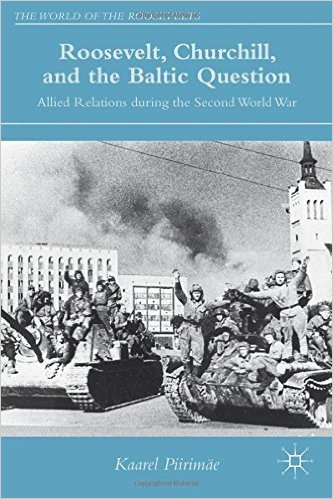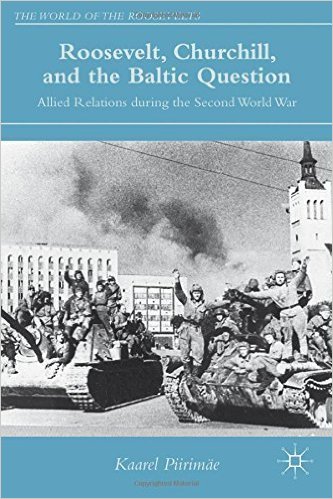
Finest Hour 170
Books, Arts & Curiosities – The Troubled Trio

December 3, 2015
Finest Hour 170, Fall 2015
Page 39
Review by Warren F. Kimball
Kaarel Piirimäe, Roosevelt, Churchill, and the Baltic Question: Allied Relations during the Second World War, New York: Palgrave Macmillan, 2014, xvi + 276 pages, $90.
ISBN 978-1137442369
 This book’s cover accurately labels the Baltic nations “a neglected corner of wartime Europe.” But Josef Stalin never neglected them, occupying Estonia, Latvia, and Lithuania without ceremony in June 1940. He had waited while fighting the Winter War with Finland in the hope that the three states would Sovietize themselves— which they did not. The swift fall of France that spring only fed Stalin’s suspicions that some sort of Anglo-German entente was afoot, prompting his move.
This book’s cover accurately labels the Baltic nations “a neglected corner of wartime Europe.” But Josef Stalin never neglected them, occupying Estonia, Latvia, and Lithuania without ceremony in June 1940. He had waited while fighting the Winter War with Finland in the hope that the three states would Sovietize themselves— which they did not. The swift fall of France that spring only fed Stalin’s suspicions that some sort of Anglo-German entente was afoot, prompting his move.
What could the little Baltic states do? Caught between the Soviet Union and Germany, they had no political leverage and even less military strength. All they really had was their own sense of cultural and (to a somewhat exaggerated degree) historic nationalism. As with Finland, the West reflexively empathized and sympathized (though much less noisily)—and did nothing. Whether the West could have done anything effective is what this book is about.
The stage was set for the entire war by the initial reactions of Britain and the United States: reactions too minor to be called policy. The personal involvement of Winston Churchill and Franklin Roosevelt showed equal indifference. Soviet concerns and reactions were far more important to the two leaders than awkward promises of self-determination made in the Atlantic Charter.
A few old-line Foreign Office diplomats called for protests, but Prime Minster Neville Chamberlain and most of his cabinet were too distracted by events in Poland to pay any attention to the Baltics. Churchill, ever the geo-politician when in office, spoke of Russia’s historic interests, telling Soviet ambassador Ivan Maiskii in October 1939 that “it would be better if they [the Baltics] were incorporated into the Soviet rather than the German state system.” Obviously a Hobson’s choice, but Churchill noted that annexation corresponded with history and geography, and could help stabilize Eastern Europe (26).

2024 International Churchill Conference
For FDR, the Baltics were far too peripheral to jeopardize his policy of promoting a long-term cooperative relationship with the Soviet Union: “the question was not how to make the world safe for democracy…but whether democracy could make the world safe from another war” (127). Roosevelt’s geo-political philosophy centered on preventing a future world war by ensuring trust and collaboration between the UK, the US, and the USSR—the great powers of that time. Churchill bought into that approach, rarely wobbling until near war’s end.
Occasionally, both the US and the UK toyed with using the Baltics as leverage with Stalin, but to no avail. He cared not about Western recognition for his actions; the Baltics were back under full Russian political control, no longer caught in what he termed “the Finnish puddle” (9). By the time of the Teheran Conference in December 1943, FDR was talking of “plebiscites” in each of the Baltics—votes he acknowledged would be won by the occupiers; votes that would give him plausible propaganda cover at home (the politics of betrayal charges did not come until after the war). Stalin would have none of it.
Arguing that Roosevelt and Churchill should have stood tall and spoken out early and often, condemning Soviet expansion and violations of self-determination, remain false either/or formulations. Neither that, nor publicly labeling them “midget states,” to use E. H. Carr’s phrase, would have been rational. The Anglo-American leaders had a war to win, and they could not do that without the Red Army. Even into early 1944, they worried about Stalin striking a deal with Hitler, leaving Germany in control of Western Europe. Piirimäe describes how both the UK and the US avoided any formal acceptance of de facto Soviet control of the Baltics (the British did recognize de jure control), which helped a little regarding postwar repatriation arguments. But, in essence, Churchill and Roosevelt and their governments chose simply to pay no serious attention to the Baltics.
A brief closing discussion of the Baltic states in the early postwar years begins: “The Baltic question had been put into cold storage by 1950” (157). Quite true. It would take the collapse of the Soviet Union to restore their briefly held independence. Whether that was and is best guaranteed by joining an alliance premised on a Russian threat or by copying the “Finnish Exception” is for history to decide.
Warren F. Kimball is Robert Treat Professor Emeritus of History at Rutgers. He is a member of the Editorial Board of Finest Hour and editor of Churchill and Roosevelt: The Complete Correspondence, 3 vols. (Princeton, 1984).
Subscribe
WANT MORE?
Get the Churchill Bulletin delivered to your inbox once a month.


